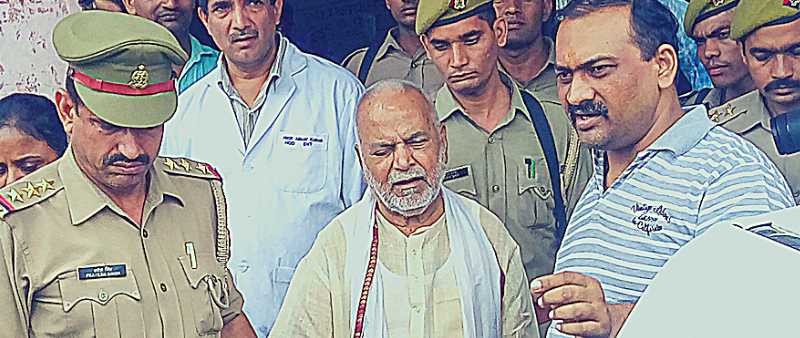While granting bail to Swami Chinmayanand, arrested on charges of raping a 23-year-old woman student studying in a law college owned by the godman himself, the judge almost pronounced the judgment in the case. The judge said that the girl was the real offender, who for reasons best known to her, had consensual sex with and later blackmailed Chinmayanad. It was only when ‘things got bad’ that she lodged a complaint with the police, the judge said. The judge also questioned why the girl kept the alleged abuse away from her parents, claiming she would not have done so were she ‘truly a victim of sexual abuse’. This is also the position held by Swami Chinmayanand, which makes the judge so wholly passing remarks from a single point of view uncomfortable.
It is not unusual for people to blame women for the crimes of men. It is also not unusual to blame the victim for crimes they have been at the receiving end of when the system fails to deliver justice. The greater the incapability of the establishment to maintain law and order, the greater the tendency to blame the victim. But when such accusations emanate from the pedestal of a high court judge, the malaise should be declared a malignancy.
Fictionalisation of an episode
The deeper problem, however, lies in the fictionalisation of an episode that needs to be established through concrete evidence. According to the judge, all girls must report instances of sexual abuse to their parents, and in order to be able to do this, must be able to immediately understand what a bad touch is, without fearing the authority of offending elders, teachers, bosses, or the like. If matters were as simple as that, we would not have needed elaborate awareness programmes, sex education, the Vishakha judgment and various committees on the harassment of women. Clearly, the judge is substituting fiction for facts.
Next comes the dangerous consequence of this fiction. Once the girl is chastised for not reporting the abuse to her parents without batting an eyelid, the judge winds up the narrative by saying that since she did not do what he thinks she should have done, her behaviour must indicate that she had been having consensual sex with Swami Chinmayanand while simultaneously blackmailing him. So, first an imaginary ideal behaviour is created, and when the reality does not fit into it, another imaginary offence is built upon the fictive premise. This is a mind that works on purely imagined scripts, characters, motives, and behaviours. When reality does not fit, torrential hermeneutics redefine, reconstruct, revise and reinterpret the truth. The fear of our times must lie in this – not merely patriarchy but something beyond it, namely the intolerance of women in the public sphere.
Also Read: The Extraordinary Slowness of the Wheels of Justice in the Chinmayanand Case
In the infamous Nirbhaya case of December 2012, the rape convicts blamed the victim for her own death. Mukesh Singh, the driver of the bus said that a woman had no business to be out at night and if she is, then she would naturally invite rape. In yet another gruesome murder of a 26-year-old veterinarian in Hyderabad by four transport drivers and helpers, it appears that the very sight of a woman driving a vehicle by herself was enough to arouse contempt. It is also interesting to note that both women were qualified professionals and hence educated.

Representative image. Women protest against sexual violence. Credit: Reuters/Files
A lethal combination
In the Chinmayanand case, the girl student was in college, and hence in the public space and that too in an educational institution. Education and presence in the public space are two lethal combinations by which men are provoked to instantly destroy the woman’s existence, first by humiliation and then by death.
The male hate for self-reliant women with independent sources of income is best expressed in the popular serial, CID. The show, which has been running for over 20 years, has independent women as the prime murderers in more than half of its episodes. In fact, as the serial became more and more entrenched into the popular mindset, the frequency of women as murders became a regularity.
The male fear of women as a potential threat to sabotage their ambitions is deeply entrenched within the constructions of masculinity: women are supposed to destroy whatever men covet. Now that India’s changing demography is bringing increased participation into the public sphere, making more people compete for fewer slots, the presence of women is looked upon as a direct assault on the opportunities for men.
Women have always been chattel for men, circulated among men through marriage (Claude Levi Strauss’s thesis on marriage), being passed on as property from father to husband to son. For a long time, widows were treated like unclaimed baggage. In short, women, on their own have no space, except for those created especially for them to keep them as artefacts.
Indeed, women are educated and accomplished but these cultural capitals are infused in them to attract husbands from higher social echelons. Despite valiant efforts by social reformers and the interventions by law in modern times, in the deep subconscious of men, women’s position vis-à-vis their life opportunities have not changed for men. Thus, any claims on the male space by women in terms of jobs, income, movement and presence is seen as an unnecessary intrusion needing a “historical correction”; if the corrective measures are no longer permitted by law or by social conventions of modern times, then that has to be done by directly punishing the woman, first by attacking her womanhood and eventually smothering her life.
Susmita Dasgupta is a policy economist and the author of Economics of the Indian Steel Industry (Routledge, UK).




